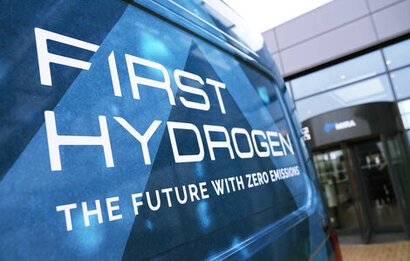
WWU is exploring zero emissions vehicle technology to suit its operational requirements and the trials provided the transport team with the opportunity to experience the benefits of a FCEV first-hand.
The first-of-its-kind van completed more than 2,000 kilometres (>1,200 miles) over the four-week trial, travelling up to 189 kilometres/117 miles per day on mostly urban roads and highways in some of South Wales’ coldest conditions.
The vehicle also demonstrated the full power capability of the fuel cell module, with outputs higher than 60kW in transient accelerations, showing capability for demanding duties, such as carrying heavier payloads, towing and powering auxiliary equipment (onboard power).
The trial had already shown there was no decrease in vehicle performance or range when operating in colder temperatures.
The FCEV was shared by two drivers from WWU’s Network Emergency & Metering Services team who are responsible for emergency metering work for more than 7.5 million customers across Wales and the south west of England. Most of the vehicle’s journeys were travelling to customer call outs, averaging 5-6 visits per day. The team has to respond quickly to calls and often covers long distances while transporting the bulky equipment needed for repairs.
“First Hydrogen’s van is lovely to drive and allowed us to get on with our job” said Alun Jones, First Call Operative (FCO) for WWU and driver in First Hydrogen’s trials. “The fact you can quickly refuel rather than charge up overnight is a massive advantage for us as sometimes we respond to calls from our homes in the middle of the night. I can definitely see the hydrogen vans working at WWU in terms of the efficiency we need.”
Crucially, the trials have provided First Hydrogen and WWU with important data that will help to inform future development.
Importantly, these trials proved that hydrogen mobility is still possible for fleet operators without access to fixed hydrogen refuelling infrastructure. The trials were supported by Protium Energy Solutions, which provided green hydrogen to fuel the vehicle and Hyppo Hydrogen Solutions, who supplied a re-deployable hydrogen refuelling unit.
DataHorizzon Research reported the global hydrogen fuel cell vehicles market is projected to grow from $2.2 billion (£1.7 billion) in 2023 to $82.1 billion (£64.2 billion) by 2032, at 49.1 percent CAGR. It anticipates that fleet operators, such as WWU, will drive zero emission vehicle sales – which includes hydrogen fuel cell commercial vehicles - as they strive to decarbonise in line with government mandates to phase out fossil fuel vehicles by 2035.
For additional information:

